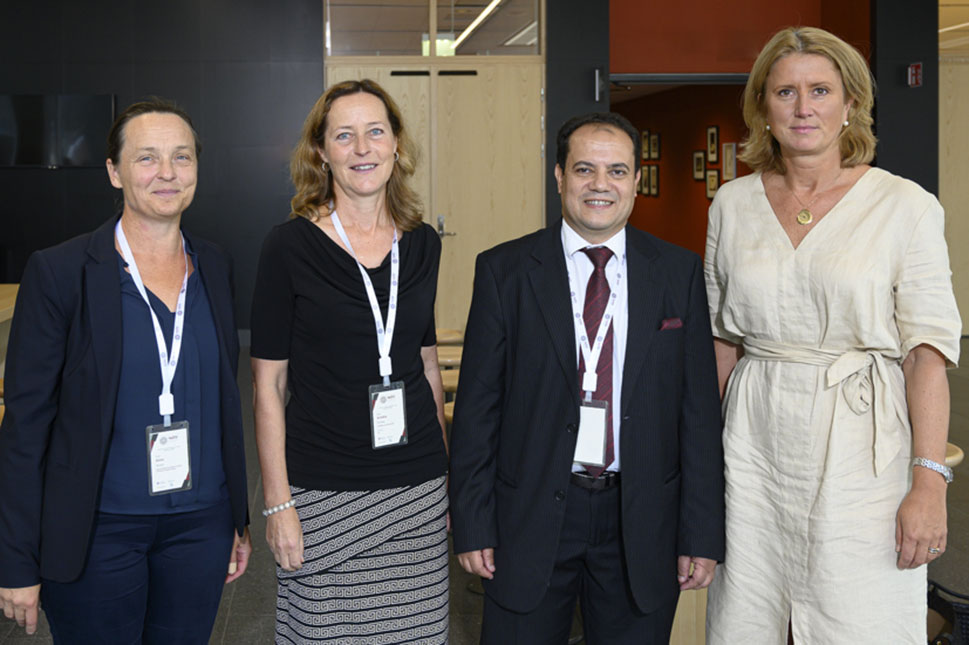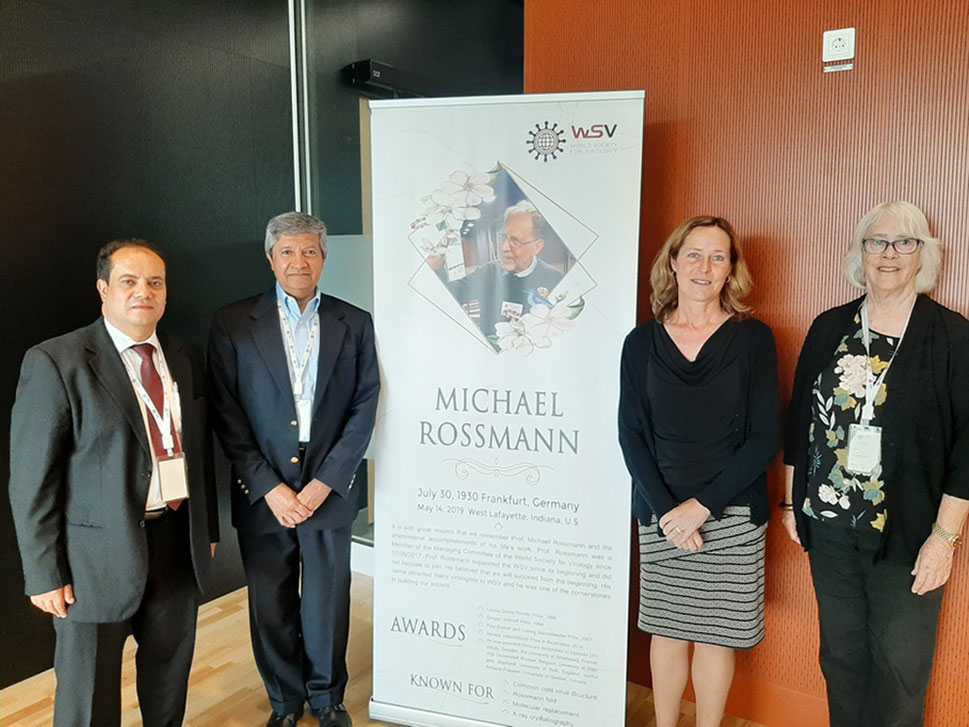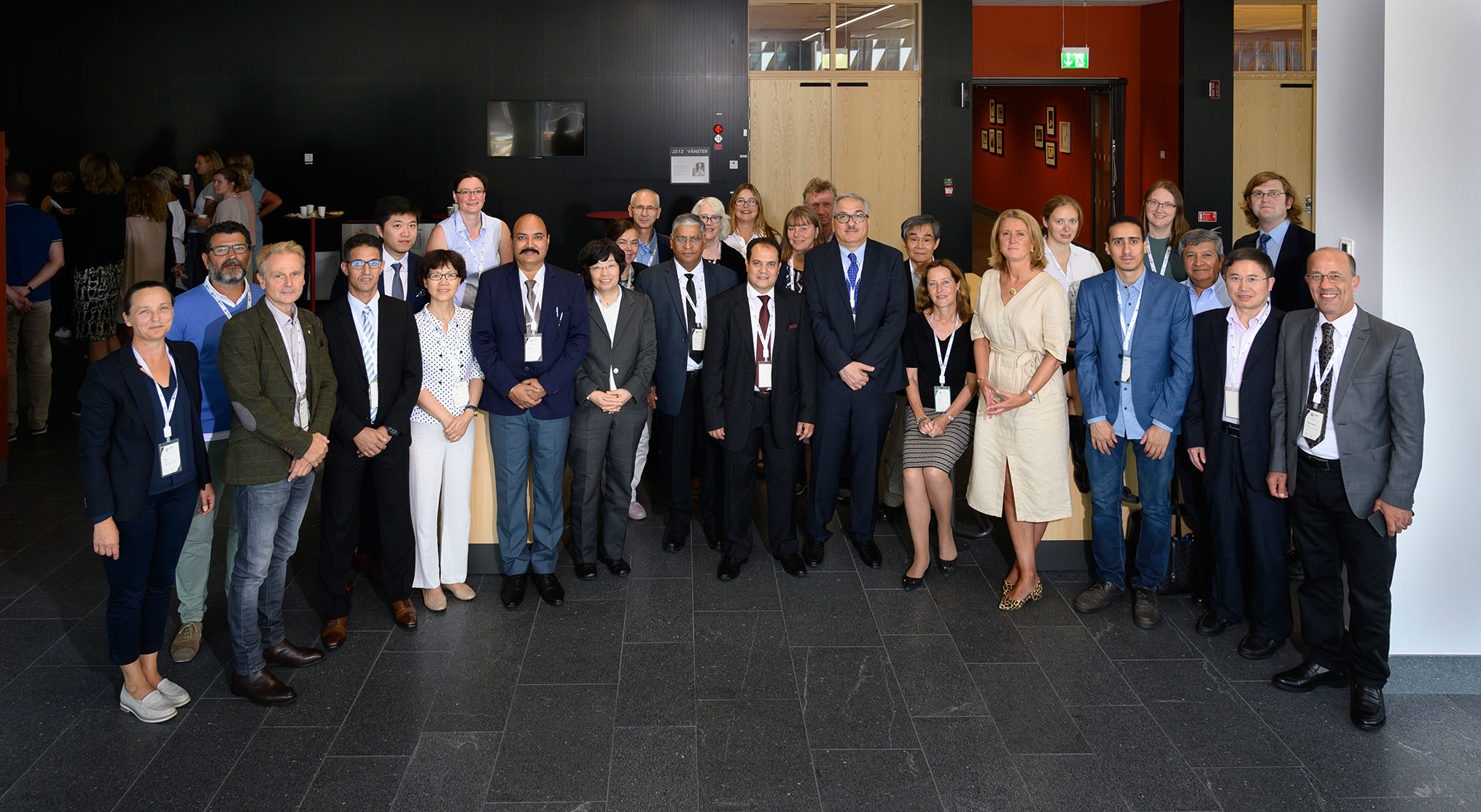HTML
-
The World Society for Virology (WSV) was founded in 6 May 2017 and incorporated on 14 December 2017 as a non-profit organization, in the state of Massachusetts in the United States of America. The overall mission of WSV is to strengthen research on viruses affecting humans, animals, plants and other organisms. The WSV's main objectives are to connect virologists worldwide, to provide educational resources, and to support a network of scientific collaboration among virologists, with a goal of helping members to advance their careers and to obtain funding, resources, and recognition for their achievements. WSV also collaborates with other international organizations and virology societies (Abdel-Moneim et al. 2017).
The first committee meeting of the WSV was supported by the Swedish Research Council and organized at the Karolinska University Hospital (KUH), Stockholm, Sweden from 25 to 27th August 2019. It included a series of presentations in different fields of virology and also panel discussions of the future plans of the WSV, including the first WSV virology congress.
-
Following the welcome dinner on 25 August, the meeting kicked off on 26 August. with an introduction and welcome message from Prof. Kristina Broliden, Division of Infectious Diseases, Department of Medicine Solna Karolinska Institutet (KI), Sweden. This was followed by the presentations of the two keynote speakers: Prof. Anna Martling, Dean, KI and Prof. Anna Färnert, Head of Division for Infectious Diseases, KUH, on the current and perspective work of KI and KUH. This was followed by a group picture (Fig. 1), a picture of the honorary speakers with meeting chairman (Fig. 2) and a series of presentations. The first presentation was delivered by Prof. Ahmed S. Abdel-Moneim (Taif University, Saudi Arabia and Beni-Suef University, Egypt) who outlined the origin of the WSV, the stages of foundation, and the recruitment of volunteer teams for different committees. He also outlined the expansion of the WSV from the few early members to the current 920 members from more than 80 countries. He also paid homage to the late Managing Committee Member, Prof. Michael G. Rossmann (30 July 1930–14 May 2019; Purdue University), and acknowledged his role in attracting scientists to join the WSV (Fig. 3).

Figure 2. Honorary speakers with the meeting chairman. Prof. Anna Martling, (Dean, Karolinska Institutet, far right) and Prof. Anna Färnert, (Head of Division for Infectious Diseases, Karolinska University Hospital, far left). Center, Prof. Kristina Broliden (Meeting Chairman, Head of Medicine Department, Karolinska Institutet) and Prof. Ahmed S. Abdel-Moneim (Meeting Chairman, WSV Acting President and Founder of the WSV).

Figure 3. Honoring the soul of Prof. Michael G. Rossmann, the late member of the Council [Managing Committee]. Prof. Ahmed Abdel-Moneim (WSV founder - Acting President), Prof. Vikram N. Vakharia (University of Maryland, Baltimore, USA), Prof. Kristina Broliden (Karolinska Institutet, Sweden) and Prof. Laura Kramer (New York State Department of Health, Albany, NY, USA).
-
In the scientific session, there was a series of presentations on different topics of virology:
-
1. South African Mobile Laboratory Response to Ebola Outbreak in West Africa—Lessons Learned, by Prof. Janusz Tadeusz Paweska, Center for Emerging Zoonotic & Parasitic Diseases NICD-NHLS, South Africa. He presented the role of hunting bats and other wildlife for human consumption in Ebola transmission and the implementation of a mobile high biocontainment facility to conduct safe and secure molecular diagnosis of Ebola virus disease in Sierra Leone.
2. MERS-CoV, an Emerging Virus from the Arabian Peninsula, by Prof. Ziad Memish, College of Medicine, Alfaisal University, Riyadh, Saudi Arabia. He outlined the history of the discovery and the current status of the MERS-CoV in the Middle East.
3. Interspecies Transmission of Bat Coronaviruses, by Prof. Zhengli Shi, Wuhan Institute of Virology, Chinese Academy of Sciences (CAS), China. She talked about the diversity of coronaviruses and about bats as natural reservoirs of diverse coronaviruses as well as the capacity of some coronaviruses to jump species barriers.
4. Emerging Arboviruses in the Americas, by Prof. Laura D. Kramer, New York State Department Health and School of Public Health State University NY, USA. Her talk was about important factors driving arbovirus emergence and establishment.
5. Maintenance Mechanism of Dengue Viruses During the Inter-Epidemic Period, by Prof. Vinod Joshi, Institute of Virology and Immunology, Amity University, India. He talked about the role of eliminating infected larvae as an effective control measure and the radical roles of transovarian transmission of dengue virus in both urban and sylvatic cycles and how the virus is maintained in asymptomatic human cases.
6. Emerging SARS and MERS Coronaviruses: From Basic Research to Drug Discovery, by Prof. Deyin Guo from the School of Medicine, Sun Yat-sen University, China. His talk was about RNA modification and an established high-throughput platform for screening inhibitors targeting coronavirus methyltransferases. His group also adopts gene-editing technologies.
-
7. Molecular evolution of hepatitis viruses and HIV in Latin America, by Prof. Flor Pujol, Laboratorio de Virología Molecular, Centro de Microbiología y Biología Cellular Instituto Venezolano de Investigaciones Científicas, Venezuela. This talk was about the types of relationship between viruses and indigenous populations.
8. Mucosal Factors of Importance for Susceptibility to HIV Infection, by Prof. Kristina Broliden. She demonstrated how the expression of epithelial junction proteins and HIV host cells are affected by injectable hormonal contraceptives.
9. Pathogenesis of Hepatitis C and Other Viruses: Molecular Basis and Animal Model Application, by Prof. Kyoko Tsukiyama-Kohara, Joint Faculty of Veterinary Medicine, Kagoshima University, Japan. She talked about the role of ribonucleotide reductase M2 in promoting RNA replication of hepatitis C virus by protecting NS5B protein from hPLIC1-dependent proteasomal degradation. In addition, the use of Tupaia belangeri (tree shrew) as an animal model for HCV and HBV infections was discussed.
-
10. Epidemiology and Clinical Impact of Emerging Human Parvoviruses, by Dr. Maria Söderlund-Venermo, Faculty of Medicine, University of Helsinki, Finland. She described the epidemiology, global distribution and clinical presentation of different human protoparvoviruses, including bufavirus, tusavirus and cutavirus, as well as bocaparvoviruses.
11. Study, Detection, and Control of Foodborne Viruses, by Dr. Matthew D. Moore from the Department of Food Science at the University of Massachusetts, Amherst, MA, USA. He described many projects with the ultimate goal of reducing foodborne virus burden, including the use of bacteria to capture and concentrate viruses, recombinase polymerase amplification, whole genome sequencing using nanopore sequencing, and utilization of a ligand-based nanopore technique for improved detection of foodborne viruses.
12. Development of Novel Viral Vaccines for Fish Aquaculture, by Prof. Vikram N. Vakharia, Institute of Marine and Environmental Technology, University of Maryland, USA. He presented fundamental mechanisms of viral genetics and the design of VLP-based vaccines as well as virus vector vaccines. He also elaborated on protein expression in insect larvae as an effective and cheap method for protein expression.
13. Detection and Genotyping of Human Enteric Viruses in Clinical and Environmental Samples, by Prof. Jesus L. Romalde, CIBUS-Facultad de Biología, Universidade de Santiago de Compostela, Spain. He reported of the genetic diversity of human sapovirus in humans and different species of bivalve shellfish and the relation between acute gastroenteritis and consumption of bivalve mollusks.
14. Emergence and Evolution of New Enteric Viruses in Animals, by Prof. Yashpal S. Malik, Indian Veterinary Research Institute, Izatnagar, India. He described the molecular evolution of rotavirus A and C as well as picobirnaviruses in animals in India.
-
15. Spillover: Jumping Viruses and the Risk of New Epidemic Diseases, by Dr. Sayeh Ezzikouri from Virology Unit, Pasteur Institute, Morocco. He talked about the emergence of new viral diseases by animal-to-human host switching and the patterns driving cross-species transmission.
16. Zoonosis Science Center (ZSC): A Multidisciplinary Platform for Zoonotic Research, by Prof. Åke Lundkvist, Uppsala University, Sweden. He elaborated on various studies of the epidemiology of potential zoonotic diseases, infection ecology and epidemiology in Uppsala.
-
17. Involvement of Persistent Viral Infections in the Development of Nervous System Diseases by Dr. Modra Murovska, Institute of Microbiology and Virology, Riga Stradiņš University, Latvia. She described the frequency and quantification of virus-specific sequences in myalgic encephalomyelitis/chronic fatigue syndrome (ME/CFS).
18. Viral Causes of Acute Flaccid paralysis (AFP), by Dr. Begona Valdazo-Gonzalez, Virology Department, National Institute of Biological Controls and Standards (NIBSC), UK. She talked about the role of poliovirus, enteroviruses and neurotropic arboviruses, as well as rabies in induction of AFP.
In the session break, promotion videos for WSV were recorded in many different languages (WSV 2019).
Emerging and Re-Emerging Viruses
Hepatitis Viruses and Human Immunodeficiency Viruses
Agricultural, Environmental and Enteric Viruses
Zoonotic Viruses
Viruses Affecting the Nervous System
-
On 27 August, in the morning session, Ahmed S. Abdel-Moneim presented the current and future plans of the WSV, after which Matthew D. Moore presented the steps that need to be taken to register WSV as a non-profit organization with 501(c) (3) status. Following these two presentations, a series of sessions concerning the future plans for WSV were conducted. The board members discussed the WSV Bylaws and the election of WSV officers. The Bylaws draft and the election criteria and rules have since been approved after extensive modifications. The election is planned to start in the end of-November 2019, when an election call is submitted to all WSV members. Other different topics were also thoroughly discussed, including online training, webinars, partnership with national and international societies and organizations, creating WSV educational resources, and determining the suitable time and place for the first WSV congress.
The following committee members that were unable to join the meeting in person in Stockholm, and had participated with advance suggestions and ideas: Council member Prof. Rosa M. del Angel, Department of Infectomics and Molecular Pathogenesis, CINVESTAV, Mexico; Members of Training and Career Development Committee: Dr. Anna A. Shtro, Research Institute of Influenza, Saint-Petersburg, Russia, Dr. El-Sayed M. Abdelwhab, Avian Influenza Virus Laboratory, Friedrich-Loeffler-Institute, Federal Research Institute for Animal Health, Germany, Dr. Emma Poole, University of Cambridge, Cambridge, UK, Dr. Berlin Londoño, Vector Biology Laboratory, Kansas State University, USA, Dr. Mamta Chawla Sarkar, Division of Virology, National Institute for Cholera and Enteric Diseases (NICED), India, Dr. Vincent Lacoste, Laboratoire des Interactions Virus-Hôtes, Institut Pasteur de la Guyane, and members of the Membership Review Committee: Dr. Declan Schroeder, Department of Veterinary Population Medicine, University of Minnesota, USA, Dr. Douglas Gladue, Plum Island Animal Disease Center, Agricultural Research Service, USDA, Dr. Mariana Baz, Université Laval, Québec City, Canada, Prof. Milind M. Gore, National Institute of Virology, Indian Council of Medical Research, India, Dr. Sareen Galbraith, Microbiology and Biomedical Science, School of Clinical and Applied Sciences, Leeds, UK, Prof. Sayed F. Abdelwhab, Department of Microbiology, Minia University, El-Minia, Egypt.
The WSV 2019 came to a close with summary remarks and honoring Kristina Broliden by a plaque for her great effort to host a successful meeting. This was followed by a tour of KI.
-
WSV thanks Prof. Kristina Broliden who raised funds and arranged all meeting logistics and Prof. Å ke Lundkvist, Zoonosis Science Center (ZSC) at the Department of Medical Biochemistry and Microbiology, Uppsala University, Sweden for being part of the organizing committee. We acknowledge the Swedish Research Council who funded our meeting and the Karolinska University Hospital that served as the venue.















 DownLoad:
DownLoad: